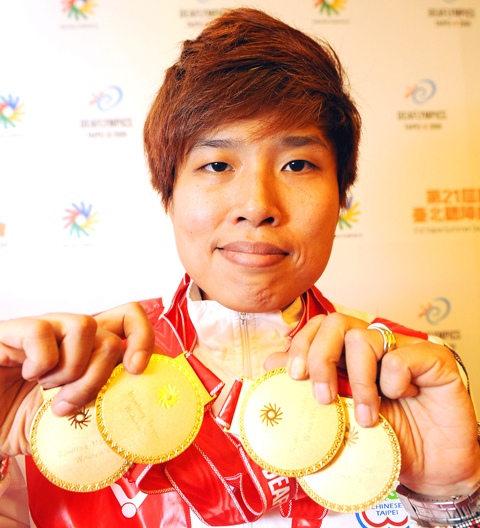On the last day of competition for the Taiwanese team, Chang Yao-chien (張堯茜) won a fourth gold in women’s bowling, while Wen Chih-hsuan (溫智璇) took home the nation’s 11th gold medal at the Deaflympics.
The crowd at Taipei Arena went wild with joy as table tennis player Wen draped the Chinese Taipei Olympic flag across his back and ran across the arena to a heroic welcome from fans after his victory.
Wen defeated Chinese opponent Wang Cong (王聰) 4-0 yesterday after beating Ukrainian Gennadii Zakladnyi by the same score in the semifinals.

PHOTO: WANG MIN-WEI, TAIPEI TIMES
Wen and Zakladnyi had faced off in the Men’s table tennis doubles event before.
Wen’s coach Huang Mei-jen (黃美珍) told reporters after the match that she thought Wen had played well.
However, “I told him that he needs to add some variety [to his shots] to confuse his opponent,” Huang said.
“Overall, he is very patient and was in good physical condition today and returned each ball with care. He employed all the strategies I told him to,” she said.
Regarding Wen’s opponent in the finals, Huang said Wang’s coach had told her that Wang “could not possibly beat Wen.”
Wen said after game he had felt intimidated facing a left-handed opponent, but was relieved when the game was over.
“I just wanted to go home,” Wen said.
Wen’s teammate Yang Jung-Tsung (楊榮宗) was eliminated in the quarterfinals.
Meanwhile, Chang won her fourth gold yesterday, scoring 3,132 points in the Women’s bowling masters finals. The silver and bronze in the event went to Toshiko Matsukiyo of Japan and Berti Themis of Greece respectively.
Chang’s victory was determined in the first game, when three strikes in a row and another strike toward the end brought her score to 225.
Matsukiyo scored 145 points in the first game. Although she beat Chang in the second game 186-161, the margin was not enough to overcome her loss in the first game.
In total, Taiwan took home five golds, three silvers and one bronze in bowling events.
Yesterday was the last day of competition for Taiwan’s athletes, who won a total of 11 gold, 11 silver and 11 bronze medals.
Four years ago, Taiwan took home nine gold, four silver and three bronze medals from the Melbourne Deaflympics.
Chao Yu-ping (趙玉平) of the Chinese Taipei Sports Association of the Deaf (CTSAD), the chief of Taiwan’s delegation, said the team had set a goal of 12 golds for Taipei, but he praised the athletes for doing their best.
Taipei Deaflympics Organizing Committee CEO Emile Sheng (盛治仁) said 91 Deaflympic records and 47 world records had been broken in Taipei.
Also See: DEAFLYMPICS TAIPEI 2009: US women strike soccer gold in Taipei

A Chinese aircraft carrier group entered Japan’s economic waters over the weekend, before exiting to conduct drills involving fighter jets, the Japanese Ministry of Defense said yesterday. The Liaoning aircraft carrier, two missile destroyers and one fast combat supply ship sailed about 300km southwest of Japan’s easternmost island of Minamitori on Saturday, a ministry statement said. It was the first time a Chinese aircraft carrier had entered that part of Japan’s exclusive economic zone (EEZ), a ministry spokesman said. “We think the Chinese military is trying to improve its operational capability and ability to conduct operations in distant areas,” the spokesman said. China’s growing

Nine retired generals from Taiwan, Japan and the US have been invited to participate in a tabletop exercise hosted by the Taipei School of Economics and Political Science Foundation tomorrow and Wednesday that simulates a potential Chinese invasion of Taiwan in 2030, the foundation said yesterday. The five retired Taiwanese generals would include retired admiral Lee Hsi-min (李喜明), joined by retired US Navy admiral Michael Mullen and former chief of staff of the Japan Self-Defense Forces general Shigeru Iwasaki, it said. The simulation aims to offer strategic insights into regional security and peace in the Taiwan Strait, it added. Foundation chair Huang Huang-hsiung

PUBLIC WARNING: The two students had been tricked into going to Hong Kong for a ‘high-paying’ job, which sent them to a scam center in Cambodia Police warned the public not to trust job advertisements touting high pay abroad following the return of two college students over the weekend who had been trafficked and forced to work at a cyberscam center in Cambodia. The two victims, surnamed Lee (李), 18, and Lin (林), 19, were interviewed by police after landing in Taiwan on Saturday. Taichung’s Chingshui Police Precinct said in a statement yesterday that the two students are good friends, and Lin had suspended her studies after seeing the ad promising good pay to work in Hong Kong. Lee’s grandfather on Thursday reported to police that Lee had sent

BUILDUP: US General Dan Caine said Chinese military maneuvers are not routine exercises, but instead are ‘rehearsals for a forced unification’ with Taiwan China poses an increasingly aggressive threat to the US and deterring Beijing is the Pentagon’s top regional priority amid its rapid military buildup and invasion drills near Taiwan, US Secretary of Defense Pete Hegseth said on Tuesday. “Our pacing threat is communist China,” Hegseth told the US House of Representatives Appropriations Subcommittee on Defense during an oversight hearing with US General Dan Caine, chairman of the Joint Chiefs of Staff. “Beijing is preparing for war in the Indo-Pacific as part of its broader strategy to dominate that region and then the world,” Hegseth said, adding that if it succeeds, it could derail